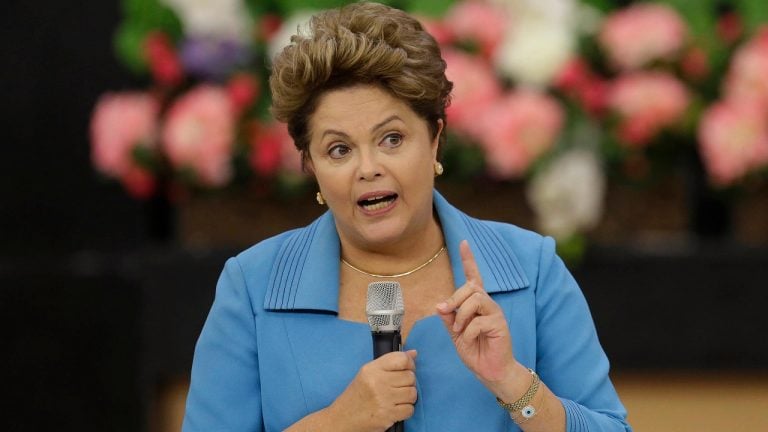
The development bank founded by the BRICS bloc of emerging economies aims to promote a multipolar financial system, its head, Dilma Rousseff, has indicated. As part of these efforts, the institution seeks to expand lending in local currencies, those of member states in particular, such the South African rand and the Brazilian real.
BRICS Development Bank Strives to Become ‘Bank Made by Developing Countries for Themselves’
The New Development Bank (NDB), set up by the BRICS group (Brazil, Russia, India, China, and South Africa), intends to increase lending in local currencies as part of efforts to reduce reliance on the U.S. but the wider objective is to change the global financial system, the bank’s Chair Dilma Rousseff explained in an interview. Speaking to the Financial Times, she stated:
We expect to lend between $8 billion and $10 billion this year. Our aim is to reach about 30 percent of everything we lend … in local currency.
Rousseff noted that the NDB plans to issue debt in rand for lending in South Africa and do the same with reals in Brazil. “We’re going to try to either do a currency swap or issue debt. And also in rupees,” the executive added. Most of the bank’s local currency lending so far has been done in Chinese yuan.
Rousseff highlighted that lending in local currency would allow borrowers in member countries to avoid exchange rate risk and variations in U.S. interest rates. While the expansion of lending in local currencies will encourage the use of alternatives to the dollar in trade and financial transactions, the NDB president emphasized:
Local currencies are not alternatives to the dollar. They’re alternatives to a system. So far the system has been unipolar … it’s going to be substituted by a more multipolar system.
Founded by the five BRICS countries in 2015, the Shanghai-headquartered NDB has so far lent $33 billion for infrastructure and sustainable development projects. The bank also accepted as members Egypt, Bangladesh, the United Arab Emirates, and Uruguay, which are not in BRICS at this point.
Rousseff revealed that the institution is currently considering membership applications from around 15 countries and is likely to approve four or five of these. While declining to name the candidates, she pointed out that diversifying its geographic representation is a priority for the NDB.
The BRICS bank was established as an alternative to U.S.-dominated financial institutions and over the years has tried to distinguish itself from the International Monetary Fund (IMF) and the World Bank by choosing not to impose political conditions on loans.
“We repudiate any kind of conditionality,” Rousseff emphasized in the interview. “Often a loan is given upon the condition that certain policies are carried out. We don’t do that. We respect the policies of each country,” she insisted.
Despite its efforts to provide an alternative to the current global financial order, the NDB had to suspend operations in Russia, a founding member, to avoid being cut off from global finances amid sanctions imposed over Moscow’s war in Ukraine. “You have to live with it,” Rousseff admitted, referring to the established international financial system.
Do you think the BRICS bank can bring significant changes to international financial relations? Share your thoughts on the subject in the comments section below.
from Bitcoin News https://ift.tt/jvfk7EC
Comments
Post a Comment